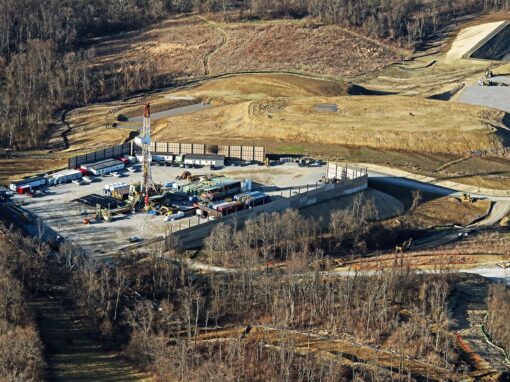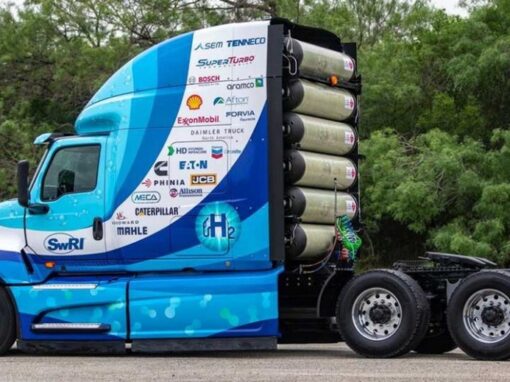Few innovations in transportation have been more transformative than aviation. Air travel has shrunk the world, connecting people and products to places across the globe. This innovation comes with a climate cost, however – in 2022 aviation accounted for 2% of global energy-related CO2 emissions, growing faster in recent decades than rail, road or shipping (IEA). With countries committing to ambitious net zero carbon emission goals by 2050, jet fuels derived from fossil fuels are quickly becoming a key decarbonization focus.
As outlined in a prior FCHEA “Transition” blog post, hydrogen can be used to fuel aerial vehicles both through direct use in fuel cell electric powertrains, and in the creation of sustainable aviation fuels (SAF) that reduce carbon emissions compared to traditional aircraft fuel. Due to its high energy density, hydrogen provides a robust source of lightweight power that allows air travel without carbon emissions. In this blog post, we will explore recent developments in hydrogen aviation technology and related airport infrastructure.
This year, Airbus announced that the modified glider at the center of its UpNext’s hydrogen contrail-studying experiment, Blue Condor, made its first hydrogen-powered flight over Nevada. The flight was the company’s first ever that used hydrogen as the sole fuel source, and it kicked off a test campaign that will conclude in a contrail-measuring mission in early 2024.
In late 2023, Airbus’ ZEROe teams powered on a hydrogen-propulsion system designed for Airbus’ electric concept aircraft known as the iron pod. In addition to the hydrogen fuel cell system, the iron pod contains the electric motors needed to spin a propeller and the units that control and keep them cool. Its successful power on at 1.2 megawatts is a pivotal step on Airbus’ ZEROe roadmap to put a hydrogen-propulsion aircraft into service by 2035.

Source: Airbus
Since FCHEA’s last update on aviation, ZeroAvia has continued to progress on its journey towards zero emission aviation. ZeroAvia completed over ten test flights in 2023, moved closer to certification on its 600kW fuel cell system small passenger planes, and partnered with commercial airlines and plane manufacturers to retrofit its ZA600 hydrogen-electric engine. ZeroAvia has signed agreements with newly launched airline Ecojet to provide up to 70 hydrogen-electric engines and 250 hydrogen-electric ZA2000 engines to Flyshare, Inc., which will be operating under the name of Air Cahana and providing regional air service in California and the West Coast of the United States (U.S.). ZeroAvia also expanded its demonstration Hydrogen Airport Refuelling Ecosystems (HARE) in the United Kingdom and the U.S., signing partnerships with Masdar and Fortum. And to close out the year, Time Magazine selected CEO and Founder Val Miftakhov as one of the world’s most influential leaders in climate action in business in its 2023 Time 100 Climate list.
Additionally, ZeroAvia announced it has been awarded $3.25 million in funding by the California Energy Commission (CEC) to develop a first-of-a-kind mobile liquid hydrogen (LH2) refueling truck for heavy-duty applications, including aviation and maritime. Funding for the project comes from the Gas R&D Program administered by the CEC and authorized by the California Public Utilities Commission. ZeroAvia will begin working with Livermore Municipal Airport in February of 2024 to design, build, and demonstrate a 10,000-liter mobile LH2 refueler with sufficient flow rates to refuel in a similar time as traditional jet fuel refills.

Source: Airbus
Apart from hydrogen-propulsion, sustainable aviation fuels (SAF) provide a path to further decarbonize aviation. The U.S. Department of Energy defines SAF as a biofuel used to power aircraft that has similar properties to conventional jet fuel but with a smaller carbon footprint. Depending on the feedstock and technologies used to produce it, SAF can reduce life cycle GHG emissions dramatically compared to conventional jet fuel. Several FCHEA members have begun investing in projects to produce sustainable aviation fuel from a variety of low and no carbon feedstocks.
FCHEA member Cummins, through its New Power business segment Accelera, recently announced that it will supply the electrolyzer technology for Gevo and Zero6 Energy. Gevo will use the green hydrogen, produced at its 20MW hydrogen production facility in Lake Preston, South Dakota, to power a bio-refinery that manufactures SAF.
FCHEA member Topsoe announced it has received funding from the Danish Energy Technology Development and Demonstration Program (EUDP) to lead the FrontFuel project, producing SAF from CO2, water, and renewable electricity. The FrontFuel project will operate in close collaboration with Sasol and Aarhus University in Denmark, where the production plant facility will be located.
FCHEA member Honeywell recently announced it has partnered with the U.S. Department of Energy’s (DOE’s) National Renewable Energy Laboratory (NREL) on a year-long collaboration to prototype and support the commercialization of a cartridge-based hydrogen fuel storage solution for Unmanned Aerial Vehicles (UAVs). Honeywell will provide technological expertise, testing for fuel cartridge technology, supply chain support, prototyping and fuel cell evaluation for the “Fuel Additives for Solid Hydrogen (FLASH) Carriers in Electric Aviation” project. The FLASH project will mature a new hydrogen carrier technology developed at NREL as part of the HyMARC (Hydrogen Materials Advanced Research Consortium) project. The program is funded by a partnership of the DOE’s Hydrogen and Fuel Cell Technologies Office, NREL, and Honeywell.
Separately, Honeywell and Worcester Polytechnic Institute (WPI) announced a new partnership in 2023 aimed at helping the aviation industry reduce its carbon footprint by examining how hydrogen fuel cells can help power the next generation of aircraft. This work focuses on hydrogen storage and power generation technology for all forms of air travel, including UAVs, passenger, and cargo travel. Honeywell will supply hydrogen equipment and technology expertise, and has established a significant presence on WPI’s campus, with lab space in Goddard Hall and offices at Gateway Park in Worcester, Massachusetts.
FCHEA member Twelve and Etihad Airways, the national carrier of the United Arab Emirates, announced a partnership this year to advance SAF made from CO2 and renewable energy. The collaboration will support Etihad’s sustainability strategy in which it plans to achieve net zero emissions by 2050 and turn waste into fuel, diverting 75% of waste from landfills by 2025.
The recent developments in hydrogen aviation technology, driven by key innovations from FCHEA members, mark a new frontier in the aviation industry. The shift towards hydrogen propulsion and sustainable aviation fuel reflects a collective commitment to addressing the sustainability challenges associated with traditional jet fuels. As these innovative technologies continue to scale, the aviation industry has the potential to transition towards a more sustainable and environmentally friendly future.



